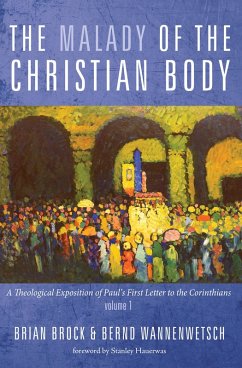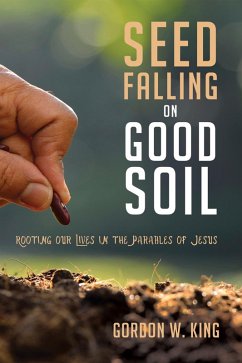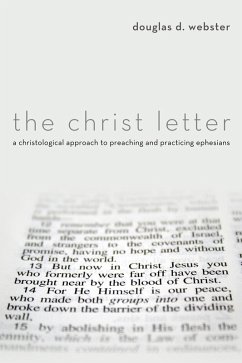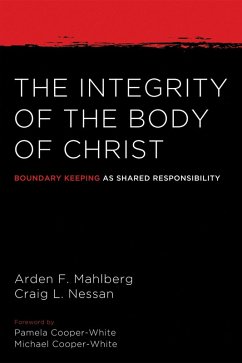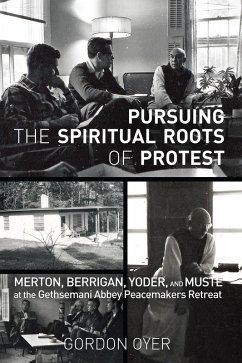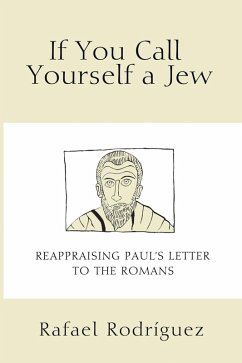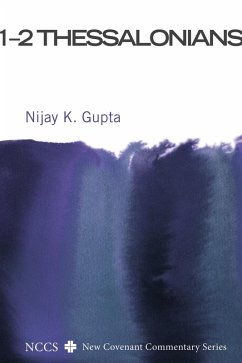The Malady of the Christian Body (eBook, ePUB)
A Theological Exposition of Paul's First Letter to the Corinthians, Volume 1

PAYBACK Punkte
10 °P sammeln!





The ailments of the contemporary church are remarkably similar to those suffered by the fractious Corinthian church in the first century. This is the challenge presented in The Malady of the Christian Body, a two-volume commentary by Brian Brock and Bernd Wannenwetsch. The manner in which Paul engages questions of factionalism, sexuality, legal conflict, idolatry, dress codes, and eating habits reveals that neither the malady he diagnoses nor the therapy he offers track the dominant accounts currently on offer of the malaise suffered by today's church. This volume depicts the Apostle as carefu...
The ailments of the contemporary church are remarkably similar to those suffered by the fractious Corinthian church in the first century. This is the challenge presented in The Malady of the Christian Body, a two-volume commentary by Brian Brock and Bernd Wannenwetsch. The manner in which Paul engages questions of factionalism, sexuality, legal conflict, idolatry, dress codes, and eating habits reveals that neither the malady he diagnoses nor the therapy he offers track the dominant accounts currently on offer of the malaise suffered by today's church. This volume depicts the Apostle as carefully examining the organic whole that is the body of Christ in order to detect obstacles to the healthy flow of powers that sustain its life. The therapy that is then offered comes by way of a redirection of the Corinthian believers' attention to the ways in which they can embrace God's active working among them to heal their broken unity. This book breaks new ground in crossing and reconfiguring the traditional disciplinary boundaries between biblical studies, systematic theology, and theological ethics.
Dieser Download kann aus rechtlichen Gründen nur mit Rechnungsadresse in A, D ausgeliefert werden.
Brian Brock is Reader in Moral and Practical Theology at the University of Aberdeen. He is the author of Singing the Ethos of God, Christian Ethics in a Technological Age, and most recently, Captive to Christ, Open to the World.
Bernd Wannenwetsch was Professor of Systematic Theology and Ethics at the University of Oxford, Chair in Theological Ethics at the University of Aberdeen and the president of the Society for the Study of Christian Ethics. His publications include Political Worship, Guter schneller Tod?, and Verlangen.
Interviewed by Amy Erickson
Amy Erickson: Both of you are systematic and moral theologians. How come you have turned to writing a biblical commentary, and how did it feel to be working outside of your usual habitat, so to speak?
Bernd Wannenwetsch:
It felt absolutely great. In fact, I don't remember I have ever had so much joy working on a project. In the end most of what made the process so satisfying came from constantly being pushed out of our normal academic comfort zone. There is a sense of intellectual adventure that comes with the challenge of having to find one's feet in unknown territory. The mental and practical preparation necessary for writing a commentary is very different than what is demanded by a monograph or scholarly article. What we found liberating about doing theology in a different literary genre is the way it pushed us not only out of the routine working patterns in our normal area but also made us take a step back from the tried and tested intellectual approaches we have found to work well enough to be repeated over and over again.
At the same time we were also surprised at the extent to which working directly on a biblical text felt like a homecoming. We really shouldn't have been surprised by this because, historically speaking, the attempt to try to understand Scripture for oneself and then help others to see what you have seen is the very impulse that gave birth to the intellectual praxis we call theology. There is no doubt that we had both been usefully prepared for this task in long having been convinced that Christian ethics, if it is going to be genuinely theological, has to be rooted in biblical inquiry. No matter how novel or "unprecedented" it may appear, every subject we think about in theology demands a fresh look at the biblical tradition in order to be understood more fully and truthfully. We discovered again that when we take ideas and dilemmas we feel to be novel to Scripture, what we discover anew that it is Scripture that is always new and fresh.
AE: What made you chose 1 Corinthians?
Bernd Wannenwetsch:
The suggestion initially came from a publisher, but the fact that the letter is so rich in discussions of concrete moral problems made the invitation immediately attractive. What we discovered not long after is that this was also a real temptation--to read Paul too instantaneously as a "fellow ethicist". We only discovered this as a temptation when it became clear that if we were really to get to grips with Paul's approach to the moral questions he discusses, we were going to have to dig deep into the doctrinal convictions and discourses that undergird his explicit moral exhortations and arguments. We often found that it was only when we resisted moralizing modes of interpreting Paul that a window swung open to a different, more exciting and ultimately more truthful understanding of what he has to say.
Brian Brock:
What was illuminating about this process is that through it we made the unexpected discovery that the letter is organized by an unexpectedly deep theological unity. Despite the fact that biblical scholars consider the letter to be largely free of textual emendation and genuinely Pauline, it is nevertheless in practice almost always read in a manner that firewalls the doctrinal and moral passages in the letter off from one another. We discovered that the letter really is not made up of separate discussions of ethical problems and worship practices that are set within some theological prefatory remarks. It is an integrated theological investigation of all these problematics at the same time. Attempting to understand Paul's moral exhortations, we were continually being drawn more deeply into his theological vision of the whole of creation and the salvation economy--which exposed the superficiality of the very common practice of dividing the book up into parts devoted to decorum in worship, sexual ethics, and a theology of love.
AE: Another unusual aspect of this book is that it is co-authored. How did you make this work for you?
Brian Brock:
We ended up developing a nice working routine, which we describe in more detail in the introduction to Malady. We wrote the text line by line sitting together at the same desk. It ended up being those hours and hours of conversation around the text that sustained our energy for what turned out to be a pretty monumental project. We usually met twice a year, at each meeting typically managing to draft up a prose version of the commentary on one chapter of Corinthians. Afterward we each separately went over this prose draft multiple times, but the beating heart of the project remained the hours spent sitting with the text, with the Greek text and several translations spread out around us. We really came to look forward to those meetings a great deal.
AE: Did you feel that the differences between your respective cultural and ecclesial upbringings, one as a German Lutheran and the other as an American from a missionary church background, shaped the way you were approaching the biblical material?
Bernd Wannenwetsch:
Absolutely. Realizing how deeply these differences affected our respective perspectives was one of the surprise realizations that came to us on route. At the most superficial level, these differences in cultural and ecclesial background forced us to articulate ourselves in ways that took into account a wider and more diverse audience. Readers will no doubt notice how often passages in the commentary address questions that are most lively in the North American context while others are more pressing for European Christians. At a deeper level it then began to become clear how these geographical and cultural differences were often linked directly to sensibilities we had inherited from noticeably different ecclesial traditions. By coming face to face with these different sensibilities we were learning to speak to each other not only as individuals but also as representatives of different church traditions.
To be aware of this "ecumenical" moment in our reading fellowship was helpful in allowing us first to see and then formulate more precisely what it was in our respective ways of having been traditioned that would attract us to particular readings of 1 Corinthians, for better or worse. In the process we began to "see" the specific blindfolds our traditions have put on us but also where they have equipped us with particularly sharp lenses. Having to become more self-aware of ways in which our respective church experiences were organizing our perception in the end helped us better to make contact with the sensibilities that are visible in the Corinthian church to whom Paul first wrote. The joint writing thus helped us detect the "Corinthians" in us, the European Lutheran the North American Congregationalist, with our respective tendencies to think and act like the factions in Corinth who assumed their way of "doing" Christianity was superior to others.
AE: How then did you deal with these different viewpoints? How did you engage them in the process of reflecting and writing together?
Bernd Wannenwetsch:
The mutual trust we have in each other's judgment allowed us to explore exegetical disagreements in a manner that never had to be settled by having a battle ending in either one interpretation "winning" or us having to agree to a compromise reading that neither of us really supported. And we never allowed ourselves the co-author's escape clause: "here we present two equally possible ways of understanding the passage"! Instead, we took disagreements as a challenge and an opening that promised to lead us to taking a fresh, deeper look at Paul's argument.
After having discovered ourselves defending deadlocked rival readings we regularly found ourselves forced to start over from scratch. Often it was as we were taking this second look at the text that we felt new insights really "came to us". Because we both knew our initial readings were not really going to work we were prepared for this experience of hearing the verbum externum, that "alien word" that can only be heard but not predicted. This being stripped of our initial readings became such a familiar process that we finally felt we needed to give it a label. We called it "reading Paul against ourselves".
AE: Where have you been surprised by your own reading of this epistle?
Brian Brock:
It was rare that a chapter did not offer us substantial surprises, for the reasons Bernd just suggested. We knew that once we began to look at a passage in earnest, we were likely to end up with a different reading than the one that initially seemed obvious to us. To take one example, when in chapter 8 (v. 7) Paul says that he would rather not eat meat than to defile the conscience of brethren who feel nervous around meat offered to idols, his aim is to confront those who believe themselves to have strong consciences. In this first discussion of eating idol meat he uses the language of "weak conscience" to suggest that those who claim to be strong are in fact devoid of a social conscience. That makes you think about what conscience is, theologically speaking. Is it a little moral judge in your head making sure you keep the universal principles of justice, or is it supposed to connect you to other people? Paul obviously presses us to conceive of conscience in the latter sense, but this is not at all how moderns are used to thinking. To think with Paul resituates the place that our brothers and sisters occupy in our self-identification and our identification as Christians. He is offering us an unfamiliar, but deeply theological and ecclesial picture of the conscience.
AE: This book ambitiously engages a wide range of scholarly domains--biblical studies, systematic theology, ethics, and philosophy. How did you handle the risk that in the process one or several of these domains is getting short-changed or watered down?
Brian Brock:
In the end we felt that to take Scripture seriously was to be forced out into disciplinary domains that the modern academy has artificially walled off from each other. Sometimes it seemed obvious to us that a received reading was based on a philosophical mistake. We had to discuss philosophical problems if we were to free the text in question from an interpretative framework that we believed was obscuring a point we felt Paul to be making. In other cases we found that contemporary biblical scholars and translators were paying very close attention to the text but in a manner that we found either breathtakingly non-theological or to be driven by questionable theological parameters. Similar challenges arose when we discussed pastoral and liturgical issues, taking us again into different types of debates and literatures. In the end we embraced this as the great wonder of the project, and why it differed so greatly from our usual practice as Christian ethicists. It was not our problems we were taking to Scripture, but the other way around: Scripture was creating problems for us--ones that were simultaneously exegetical and existential.
Who do you hope will read this work?
Bernd Wannenwetsch:
While we would love to see this book being read and discussed by members of our own guild--that of academic theologians, including, dare we say, the odd theologically interested biblical scholar--our main hope is that it will be attractive to those who engage with Scripture in the context of ecclesial proclamation, those pastors who might find some of our suggestions illuminating as they prepare sermons. We would also be delighted if the book finds its way into the hands of some Christian laypeople who have not yet given up on academic theologians but remain hungry for works that offer them some meaty yet accessible food for thought that helps them grow as Christians and as human beings.
Bernd Wannenwetsch was Professor of Systematic Theology and Ethics at the University of Oxford, Chair in Theological Ethics at the University of Aberdeen and the president of the Society for the Study of Christian Ethics. His publications include Political Worship, Guter schneller Tod?, and Verlangen.
Interviewed by Amy Erickson
Amy Erickson: Both of you are systematic and moral theologians. How come you have turned to writing a biblical commentary, and how did it feel to be working outside of your usual habitat, so to speak?
Bernd Wannenwetsch:
It felt absolutely great. In fact, I don't remember I have ever had so much joy working on a project. In the end most of what made the process so satisfying came from constantly being pushed out of our normal academic comfort zone. There is a sense of intellectual adventure that comes with the challenge of having to find one's feet in unknown territory. The mental and practical preparation necessary for writing a commentary is very different than what is demanded by a monograph or scholarly article. What we found liberating about doing theology in a different literary genre is the way it pushed us not only out of the routine working patterns in our normal area but also made us take a step back from the tried and tested intellectual approaches we have found to work well enough to be repeated over and over again.
At the same time we were also surprised at the extent to which working directly on a biblical text felt like a homecoming. We really shouldn't have been surprised by this because, historically speaking, the attempt to try to understand Scripture for oneself and then help others to see what you have seen is the very impulse that gave birth to the intellectual praxis we call theology. There is no doubt that we had both been usefully prepared for this task in long having been convinced that Christian ethics, if it is going to be genuinely theological, has to be rooted in biblical inquiry. No matter how novel or "unprecedented" it may appear, every subject we think about in theology demands a fresh look at the biblical tradition in order to be understood more fully and truthfully. We discovered again that when we take ideas and dilemmas we feel to be novel to Scripture, what we discover anew that it is Scripture that is always new and fresh.
AE: What made you chose 1 Corinthians?
Bernd Wannenwetsch:
The suggestion initially came from a publisher, but the fact that the letter is so rich in discussions of concrete moral problems made the invitation immediately attractive. What we discovered not long after is that this was also a real temptation--to read Paul too instantaneously as a "fellow ethicist". We only discovered this as a temptation when it became clear that if we were really to get to grips with Paul's approach to the moral questions he discusses, we were going to have to dig deep into the doctrinal convictions and discourses that undergird his explicit moral exhortations and arguments. We often found that it was only when we resisted moralizing modes of interpreting Paul that a window swung open to a different, more exciting and ultimately more truthful understanding of what he has to say.
Brian Brock:
What was illuminating about this process is that through it we made the unexpected discovery that the letter is organized by an unexpectedly deep theological unity. Despite the fact that biblical scholars consider the letter to be largely free of textual emendation and genuinely Pauline, it is nevertheless in practice almost always read in a manner that firewalls the doctrinal and moral passages in the letter off from one another. We discovered that the letter really is not made up of separate discussions of ethical problems and worship practices that are set within some theological prefatory remarks. It is an integrated theological investigation of all these problematics at the same time. Attempting to understand Paul's moral exhortations, we were continually being drawn more deeply into his theological vision of the whole of creation and the salvation economy--which exposed the superficiality of the very common practice of dividing the book up into parts devoted to decorum in worship, sexual ethics, and a theology of love.
AE: Another unusual aspect of this book is that it is co-authored. How did you make this work for you?
Brian Brock:
We ended up developing a nice working routine, which we describe in more detail in the introduction to Malady. We wrote the text line by line sitting together at the same desk. It ended up being those hours and hours of conversation around the text that sustained our energy for what turned out to be a pretty monumental project. We usually met twice a year, at each meeting typically managing to draft up a prose version of the commentary on one chapter of Corinthians. Afterward we each separately went over this prose draft multiple times, but the beating heart of the project remained the hours spent sitting with the text, with the Greek text and several translations spread out around us. We really came to look forward to those meetings a great deal.
AE: Did you feel that the differences between your respective cultural and ecclesial upbringings, one as a German Lutheran and the other as an American from a missionary church background, shaped the way you were approaching the biblical material?
Bernd Wannenwetsch:
Absolutely. Realizing how deeply these differences affected our respective perspectives was one of the surprise realizations that came to us on route. At the most superficial level, these differences in cultural and ecclesial background forced us to articulate ourselves in ways that took into account a wider and more diverse audience. Readers will no doubt notice how often passages in the commentary address questions that are most lively in the North American context while others are more pressing for European Christians. At a deeper level it then began to become clear how these geographical and cultural differences were often linked directly to sensibilities we had inherited from noticeably different ecclesial traditions. By coming face to face with these different sensibilities we were learning to speak to each other not only as individuals but also as representatives of different church traditions.
To be aware of this "ecumenical" moment in our reading fellowship was helpful in allowing us first to see and then formulate more precisely what it was in our respective ways of having been traditioned that would attract us to particular readings of 1 Corinthians, for better or worse. In the process we began to "see" the specific blindfolds our traditions have put on us but also where they have equipped us with particularly sharp lenses. Having to become more self-aware of ways in which our respective church experiences were organizing our perception in the end helped us better to make contact with the sensibilities that are visible in the Corinthian church to whom Paul first wrote. The joint writing thus helped us detect the "Corinthians" in us, the European Lutheran the North American Congregationalist, with our respective tendencies to think and act like the factions in Corinth who assumed their way of "doing" Christianity was superior to others.
AE: How then did you deal with these different viewpoints? How did you engage them in the process of reflecting and writing together?
Bernd Wannenwetsch:
The mutual trust we have in each other's judgment allowed us to explore exegetical disagreements in a manner that never had to be settled by having a battle ending in either one interpretation "winning" or us having to agree to a compromise reading that neither of us really supported. And we never allowed ourselves the co-author's escape clause: "here we present two equally possible ways of understanding the passage"! Instead, we took disagreements as a challenge and an opening that promised to lead us to taking a fresh, deeper look at Paul's argument.
After having discovered ourselves defending deadlocked rival readings we regularly found ourselves forced to start over from scratch. Often it was as we were taking this second look at the text that we felt new insights really "came to us". Because we both knew our initial readings were not really going to work we were prepared for this experience of hearing the verbum externum, that "alien word" that can only be heard but not predicted. This being stripped of our initial readings became such a familiar process that we finally felt we needed to give it a label. We called it "reading Paul against ourselves".
AE: Where have you been surprised by your own reading of this epistle?
Brian Brock:
It was rare that a chapter did not offer us substantial surprises, for the reasons Bernd just suggested. We knew that once we began to look at a passage in earnest, we were likely to end up with a different reading than the one that initially seemed obvious to us. To take one example, when in chapter 8 (v. 7) Paul says that he would rather not eat meat than to defile the conscience of brethren who feel nervous around meat offered to idols, his aim is to confront those who believe themselves to have strong consciences. In this first discussion of eating idol meat he uses the language of "weak conscience" to suggest that those who claim to be strong are in fact devoid of a social conscience. That makes you think about what conscience is, theologically speaking. Is it a little moral judge in your head making sure you keep the universal principles of justice, or is it supposed to connect you to other people? Paul obviously presses us to conceive of conscience in the latter sense, but this is not at all how moderns are used to thinking. To think with Paul resituates the place that our brothers and sisters occupy in our self-identification and our identification as Christians. He is offering us an unfamiliar, but deeply theological and ecclesial picture of the conscience.
AE: This book ambitiously engages a wide range of scholarly domains--biblical studies, systematic theology, ethics, and philosophy. How did you handle the risk that in the process one or several of these domains is getting short-changed or watered down?
Brian Brock:
In the end we felt that to take Scripture seriously was to be forced out into disciplinary domains that the modern academy has artificially walled off from each other. Sometimes it seemed obvious to us that a received reading was based on a philosophical mistake. We had to discuss philosophical problems if we were to free the text in question from an interpretative framework that we believed was obscuring a point we felt Paul to be making. In other cases we found that contemporary biblical scholars and translators were paying very close attention to the text but in a manner that we found either breathtakingly non-theological or to be driven by questionable theological parameters. Similar challenges arose when we discussed pastoral and liturgical issues, taking us again into different types of debates and literatures. In the end we embraced this as the great wonder of the project, and why it differed so greatly from our usual practice as Christian ethicists. It was not our problems we were taking to Scripture, but the other way around: Scripture was creating problems for us--ones that were simultaneously exegetical and existential.
Who do you hope will read this work?
Bernd Wannenwetsch:
While we would love to see this book being read and discussed by members of our own guild--that of academic theologians, including, dare we say, the odd theologically interested biblical scholar--our main hope is that it will be attractive to those who engage with Scripture in the context of ecclesial proclamation, those pastors who might find some of our suggestions illuminating as they prepare sermons. We would also be delighted if the book finds its way into the hands of some Christian laypeople who have not yet given up on academic theologians but remain hungry for works that offer them some meaty yet accessible food for thought that helps them grow as Christians and as human beings.
Produktdetails
- Verlag: Wipf and Stock Publishers
- Seitenzahl: 280
- Erscheinungstermin: 8. November 2016
- Englisch
- ISBN-13: 9781498234191
- Artikelnr.: 55266891
Für dieses Produkt wurde noch keine Bewertung abgegeben. Wir würden uns sehr freuen, wenn du die erste Bewertung schreibst!
Eine Bewertung schreiben
Eine Bewertung schreiben
Andere Kunden interessierten sich für



